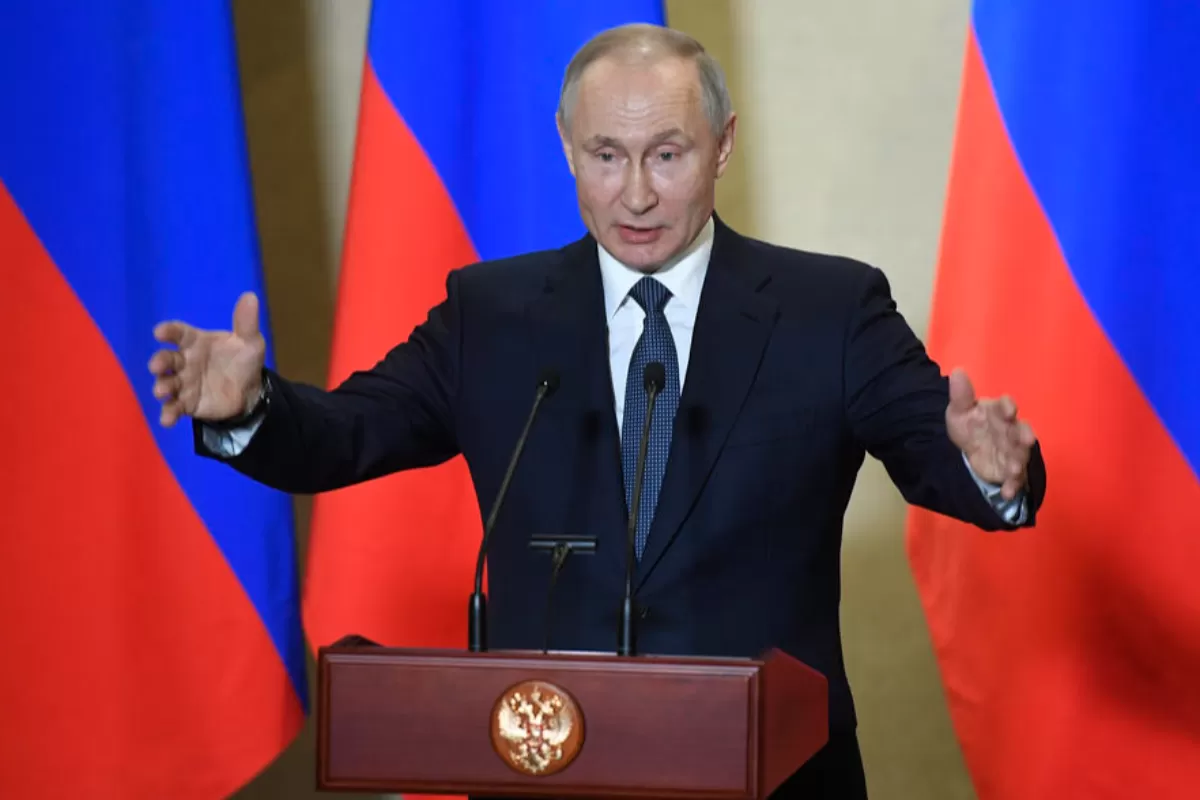
Ukraine is a neo-Nazi state, used by the West as an instrument against Russia, but its population does not want a real rapprochement with NATO. These false narratives have been promoted by Moscow for years, especially through the media channels it controls; this time, the one who resumed them was President Vladimir Putin himself.
NEWS: “Ukraine is now formed as a counterweight to Russia, so no one notices anything, not even the swastika displayed on the streets of Ukrainian cities by neo-Nazis […] There is nothing new about this, the Ukrainian power’s stance against Crimea is well known. The true will of the Crimean people is ignored, which does not match the statements made […] At least 50% of the people of Ukraine do not want their state to join NATO. They are smart people. I speak with not a hint of irony. They, who do not want to join, do not want to be in the line of fire, they do not want to be a bargaining chip or cannon fodder. These people feel that they belong to our common civilization and do not accept that one part of it fights with the other, dancing to foreign music”.Narratives: 1. Ukraine is a neo-Nazi state, encouraged and supported by the West for its anti-Russian position. 2. Kiev's stand on the legal status of Crimea in Ukraine runs counter to the principles of democracy, as the local population has decided to unite with Russia. 3. At least 50% of Ukrainians do not want their country to join NATO because in this case they would become cannon fodder. 4. Ukrainians are part of the Russian civilization.Local context / ethos: After Russia's annexation of Crimea in 2014 and the launch of military action in Donbass, the Kremlin started spreading various false narratives about Ukraine (“false state”, “Nazi state”, “Western colony”), but also about NATO or EU (“colonizers”, “imperialists”). Moscow used various metanarratives about the Ukrainian people, including that the latter is part of the Russian world. Ukraine is seen as an integral part of historical Russia, whose distancing from Moscow would be a real geopolitical catastrophe. One of Putin's ideologues is Aleksandr Dughin, who writes in his books that without Ukraine, Russia will never succeed in becoming a Eurasian empire that resists the “expansion of the Atlanticists” - the United States and NATO.Any actions by Kiev to distance itself from Russia’s Soviet or neo-Soviet narratives are termed as neo-Nazi. The Russian press considers Ukraine's takeover of Western approaches to the past (for example, the condemnation of communism) as a betrayal, an attempt to rehabilitate and revive Nazism. Moreover, the Russian press writes that the West has forgotten that thanks to the USSR (Russia) it was liberated by the Nazis, and now it encourages Nazi ideology in Ukraine.The Russian press frequently writes about Crimea, which became a “de facto” part of Russia in March 2014 following a referendum, held without international observers and under pressure from the Russian army, in which 95.6% of participants were in favor of joining The Russian Federation.Purpose: The purpose of these narratives, grouped into various metanarratives, which are uttered directly by the President of Russia, is to legitimize Russia's presence in Donbass and Crimea, but also to sow distrust of NATO and the EU. The West is portrayed as a “force of darkness”, while the Russian world is the “force of light”.Why the narratives are false: In reality, we cannot talk about Crimea democratically joining Russia, but about an annexation, condemned by most international organizations and global leaders. The Crimean referendum, held without international observers and with “little green men” patrolling the streets (the Russian regular army), was not a manifestation of the will of the people, as Putin claims, but an attempt to cover up the illegal annexation.On the other hand, we cannot talk about any rebirth or rehabilitation of Nazism in Ukraine. Nazi ideology has been condemned and banned in all Western states, and also in Ukraine. The Kremlin's narratives are based on the Soviet stereotype: “whoever is not with us is against us”. Without any viable arguments to support the false statements about Nazism in Ukraine, both the Russian press and Putin claim that the West wants Ukrainian Nazism to be anti-Russian and make a series of comparisons with Hitler to arouse negative emotions in the post-Soviet collective mind. It should be noted that Ukraine has a “Law on the Condemnation of Totalitarian Communist and Nazi Regimes and Their Symbolism”, while in Russia, the rehabilitation of Stalinism is underway. Russia's history textbooks emphasize the important role of Joseph Stalin in consolidating the Soviet Union and say that the crimes he committed were out “of historical necessity”.
The Russian leader’s narratives on Ukrainians’ anti-NATO stance are also false.
According to the latest opinion poll, we cannot talk about a rejection by 50% of the population of the idea of joining this alliance. According to sociological research, 48% of citizens want Ukraine to join NATO, while only 28% oppose accession (by no means over 50%, as Putin said).
Check sources:


